Donald Trump nominee decried criticism of judges, senators agree
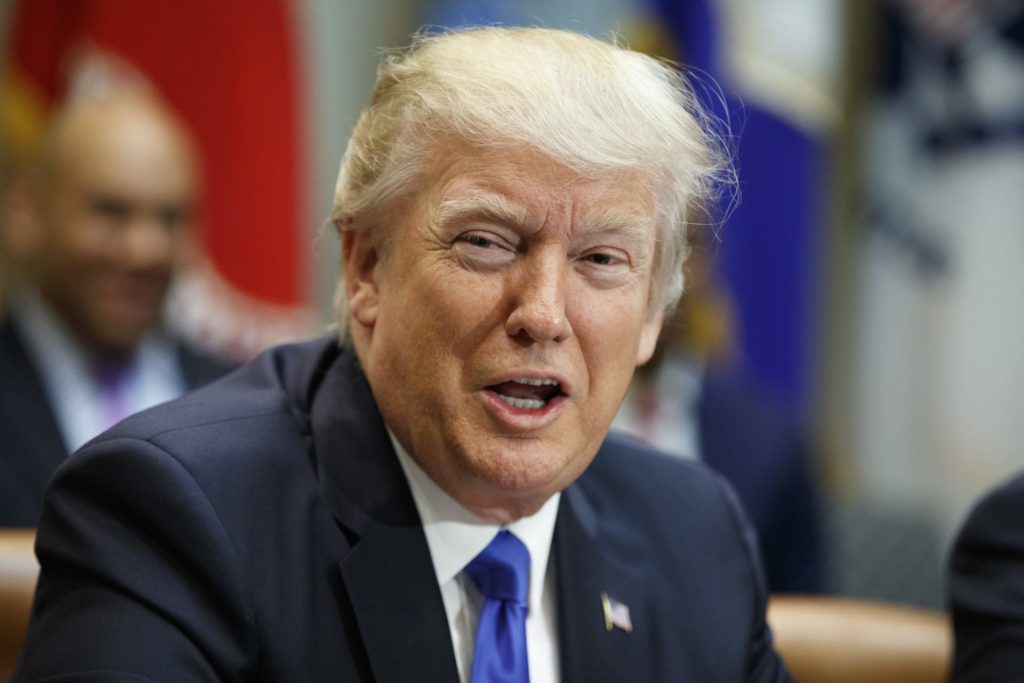
President Donald Trump insisted Thursday that comments by his Supreme Court nominee criticizing his own attacks on the judiciary were “misrepresented,” even as Republican and Democratic lawmakers vouched for the veracity of the remarks. Trump responded after private rebukes from Judge Neil Gorsuch, who said in meetings with lawmakers on Wednesday that the president’s comments about federal judges were “disheartening.” Gorsuch, who was nominated by Trump last week to the nation’s highest court, made the comments in meetings with senators after Trump accused an appeals court panel considering his immigration and refugee executive order of being “so political.” Over the weekend, he labeled a judge who ruled on his executive order a “so-called judge” and referred to the ruling as “ridiculous.” Democratic Sen. Richard Blumenthal of Connecticut first relayed Gorsuch’s remarks on Wednesday following a meeting with him. Trump’s own confirmation team for Gorsuch later confirmed he had made the remarks. But Trump said during a Thursday luncheon with senators that Blumenthal had misrepresented Gorsuch. “His comments were misrepresented. And what you should do is ask Senator Blumenthal about his Vietnam record that didn’t exist after years of saying it did,” he said. Blumenthal, who served in the Marine Corps Reserves during Vietnam, apologized in 2010 for saying he had served in Vietnam. The president made the comments while making the case for Gorsuch during a luncheon with 10 senators, including six of Blumenthal’s fellow Democrats. Blumenthal, a former state attorney general, argued Thursday that Gorsuch would need to go further to publicly denounce Trump’s verbal assault on judicial independence. “He needs to condemn Donald Trump’s attacks publicly and it needs to be much stronger, more explicit and direct than has been done so far,” Blumenthal said. “Unless it is done publicly in a clear condemnation, it will not establish his independence.” Lawmakers from both parties quickly vouched for the veracity of the remarks the senator said Gorsuch made. GOP former Sen. Kelly Ayotte, who is helping with Gorsuch’s confirmation and was at the meeting, issued a statement saying Gorsuch made clear he was not referring to any specific case. But she said the nominee said he finds any criticism of a judge’s integrity and independence to be “disheartening and demoralizing.” Senate Minority Leader Chuck Schumer, D-N.Y., and Sen. Ben Sasse, R-Neb., each confirmed that Gorsuch made the same comments to them. Sasse told MSNBC’s “Morning Joe,” ”Frankly, he got pretty passionate about it.” He added that Gorsuch said any attack on the “‘brothers or sisters of the robe is an attack on all judges’.” Fellow Connecticut Democratic Sen. Chris Murphy came to Blumenthal’s defense Thursday, lashing out in a tweet directed at Trump: “Ha! As a prosecutor, Dick used to put guys like u in jail. Now, u use your position to mock vets, he uses his to make their lives better.” Gorsuch’s comments came at the end of a week of meetings with members of the Senate, which is considering his nomination. His response may have been aimed at drawing a line of separation with the new president. The 9th U.S. Circuit Court of Appeals is weighing the appeal of Trump’s executive order on immigration, which included a temporary travel ban on people from seven Muslim-majority countries. In a hearing Tuesday, judges on the appeals court challenged the administration’s claim that the ban was motivated by terrorism fears, but they also questioned an attorney’s argument that it unconstitutionally targeted Muslims. Trump told visiting police chiefs Wednesday that a portion of the immigration law gives him the power to enact the ban, calling it “beautifully written” and saying, “A bad high school student would understand this.” “Courts seem to be so political and it would be so great for our justice system if they would be able to read a statement and do what’s right,” Trump added. “And that has to do with the security of our country, which is so important.” Since a lower-court judge blocked the order last week, Trump has assailed the decision, leading legal experts, Democrats and some Republicans to question whether his remarks might jeopardize the independence of the judiciary. Others have expressed fears he may be attempting to use political influence to sway the courts. The president has repeatedly said foreigners are “pouring in” since the ban was put on hold and suggested that blocking the order would be dangerous for U.S. citizens. On Wednesday he tweeted, “Big increase in traffic into our country from certain areas, while our people are far more vulnerable, as we wait for what should be EASY D!” The administration has not provided any information to support his claims. Republished with permission of The Associated Press.
Incumbents have better-than-average year in 2016, says Sabato’s Crystal Ball

It was a good year to run as an incumbent according to an article published Thursday in Sabato’s Crystal Ball. “Looking over the down-ballot outcome, there’s one inescapable conclusion in a year that was defined by a political outsider, Donald Trump, winning the presidency: It was still a really good year to run as an incumbent in 2016, all things considered,” the report states. Since the end of World War II, about 93 percent of incumbent representatives, 80 percent of senators and 73 percent of governors won re-election, but the 2016 cycle beat those averages handily. Overall, 27 of 29 senators, four out of five governors and 380 out of 393 representatives running for re-election won another term on Election Day. More incumbents could have won re-election, too, were it not for court-ordered redistricting in Florida, North Carolina and Virginia that put a handful of incumbents in each state at a disadvantage. Also, outgoing North Carolina Republican Gov. Pat McRory and exiting New Hampshire Republican Sen. Kelly Ayotte each lost their re-election bids by slim margins. There will still be plenty of new blood in Washington D.C. and state capitols next year even though incumbents enjoyed a high success rate. Seven new governors will take office next year, and about an eighth of the House will be new when the next Congress convenes. The Senate will also welcome seven new members, and will likely add an eighth after Alabama Republican Sen. Jeff Sessions’ confirmation hearings for the Attorney General job. “However, despite the fact that there is some churn in Congress and in the statehouses, the reality is that if an incumbent is on the ballot, he or she typically has good odds of winning,” Kyle Kondik and Geoffrey Skelley wrote. “That’s been true for much of recent American history, and it was still true in 2016.”
Donald Trump as ‘role model’? Kelly Ayotte says she misspoke
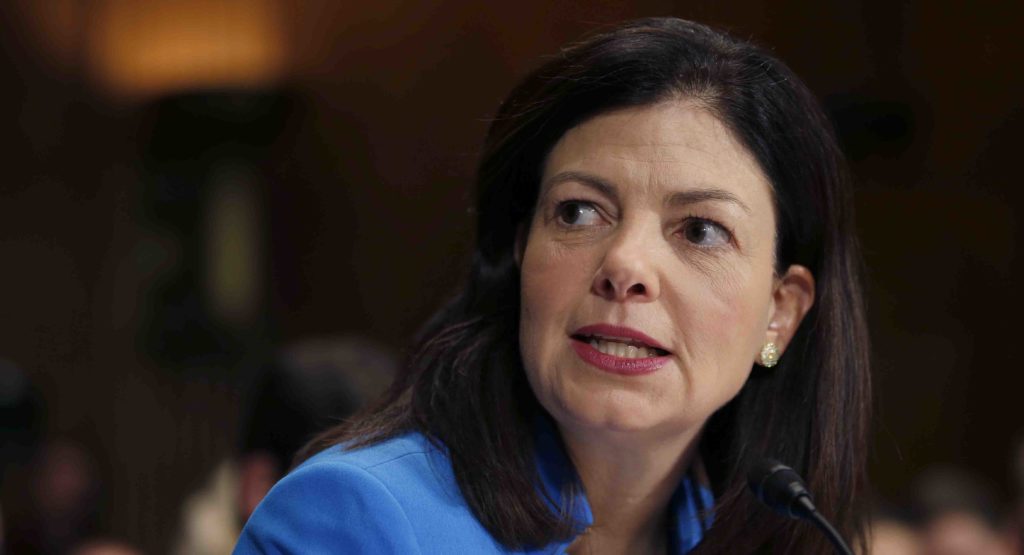
Sen. Kelly Ayotte‘s embrace of Donald Trump as a role model for children – and her abrupt reversal – underscored the risks the Republican presidential candidate poses for purple-state GOP senators who like her are battling for their political lives. Ayotte, seeking a second Senate term from New Hampshire, used a televised debate against Democratic challenger Gov. Maggie Hassan to say she “absolutely” would tell a child to aspire to be like Trump. Her campaign quickly distributed a statement afterward saying she “misspoke,” and Tuesday she told reporters that “neither Donald Trump nor Hillary Clinton have set a good example.” Ayotte’s remark proved irresistible for Sen. Elizabeth Warren, D-Mass., an active campaigner for her party who’s had repeated, sharp exchanges with Trump. “Think about it: @realDonaldTrump calls Latinos rapists, African Americans thugs, & women fat pigs, & Kelly Ayotte thinks he’s a role model,” Warren tweeted. Democrats chortled that Ayotte, considered one of the more vulnerable GOP incumbents, had fumbled with potentially devastating consequences for her re-election bid. They said she wounded herself twice: first by citing as a role model a candidate who’s openly ridiculed women, the handicapped and others and second by a retreat that smacked of insincerity and political repositioning. “I assume this question we’re going to hear a lot more of in Senate debates, and Kelly Ayotte created the textbook on how not to answer,” said Democratic pollster Geoffrey Garin. Democratic pollster Celinda Lake said it was “the unqualified nature of it and her tone” that made Ayotte’s comment truly damaging. “It’s like, ‘What are you talking about, sister?’” she said. With the GOP’s 54-46 Senate control at stake in November, Ayotte is among a half-dozen Republicans in competitive campaigns or running in swing states like Ohio, Florida and North Carolina that will help determine whether Trump or Clinton takes the White House. Asked Tuesday whether Trump was an exemplar for children, several of them avoided the trap. “The simple answer is no” and neither is Clinton, Sen. Pat Toomey, R-Pa., who’s not endorsed Trump, told reporters in Wilkes-Barre, Pennsylvania. “Let’s just say the vulgarity and gratuitous insults of people. This is not exactly the way I encourage my kids to behave.” Sen. Roy Blunt, R-Mo., also facing re-election, stopped short of labeling Trump a role model. Blunt “believes Missourians should choose their own role models,” said campaign spokesman Burson Snyder. And Sen. Richard Burr, R-N.C., said, “I, like many Americans, take issue with some of the rhetoric and actions that have come from both him and Hillary Clinton, and neither are people I’d hold up as exemplary role models.” Trump slightly trails Clinton in the latest national polls after his latest taunts, which have included mimicking how the Democrat staggered to a car after being diagnosed with pneumonia and jeering a former Miss Universe for gaining weight. In a startling departure from most presidential candidates’ efforts to avoid alienating blocs of voters, Trump has denigrated the handicapped, women, Hispanics and others. “The message is run as local a race as possible, and try to stay away from Trump as much as you can,” said Ron Bonjean, a GOP strategist. On Monday night, Ayotte initially answered indirectly when a debate moderator asked if she would point to Trump as a role model for children. When the questioner persisted, she said, “I believe he can serve as president so absolutely I would do that.” The campaign of Hassan, a two-term governor, quickly produced a 60-second internet ad featuring Ayotte’s response and juxtaposing it with Trump comments imitating a handicapped reporter, referring to a woman’s “fat, ugly face” and describing Fox News’ Megyn Kelly as having “blood coming out of her wherever.” Around 39 percent of New Hampshire voters are independents, with Republicans slightly outnumbering Democrats in the remaining group. That makes questions like Monday night’s difficult for Ayotte. Distancing herself from Trump risks upsetting his supporters, but embracing him too tightly could alienate independents and Clinton voters, whom she will need for re-election. Clinton has led Trump by modest margins in recent New Hampshire polls. Ayotte has labored all year to express her views about Trump. She initially said she would support Trump but not endorse him, then in August said would vote for him but not endorse him. Republished with permission of The Associated Press.
Donald Trump to try to steady campaign with economic speech
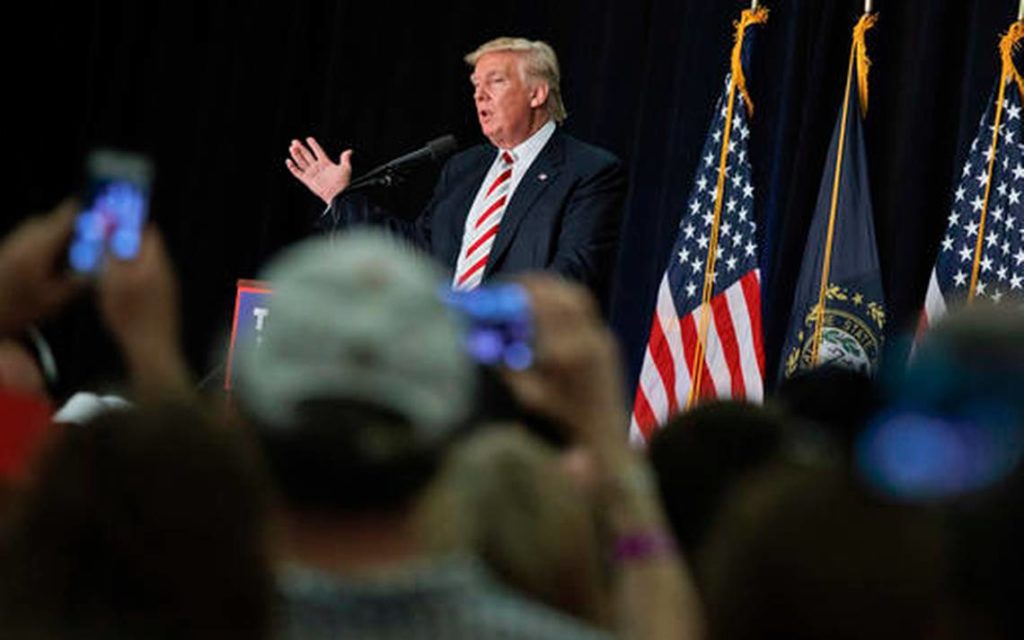
Donald Trump is trying to shift from a disastrous stretch of his presidential campaign to one focused on policy and party unity. But even as his allies speak of lessons the political newcomer has learned, two of his staunchest Republican critics warn that he could be heading for losses in a pair of battleground states. Trump is set to deliver an economic speech on Monday to the prestigious Detroit Economic Club in his effort to step past his spats over the past 10 days with the Muslim-American parents of a slain Army captain and the leaders of a Republican Party he has promised to unite. “Mr. Trump on Monday will lay out a vision that’s a growth economic plan” that will focus on cutting taxes, cutting regulation, energy development and boosting middle-class wages, campaign chairman Paul Manafort said in remarks broadcast Sunday on Fox Business. “When we do that, we’re comfortable that we can get the agenda and the narrative of the campaign back on where it belongs, which is comparing the tepid economy under Obama and Clinton, versus the kind of growth economy that Mr. Trump wants to build.” What came before Monday’s speech, Manafort suggested, doesn’t count in the race to Election Day on Nov. 8. “It’s a three-month campaign,” he said. Trump may have done irreversible damage in two critical states, Arizona and Ohio, with an approach to immigration reform that some say is divisive, two fellow Republicans say. Trump wants to build a wall between the United States and Mexico and now says he wants to suspend immigration from “terror countries” — though he has yet to say what those are. Ohio Gov. John Kasich, who lost the Republican nomination to Trump, has not endorsed the billionaire and skipped the party’s convention in Cleveland, said Trump faces a difficult climb in a state that’s a must-win for Republican presidential candidates. “He’s going to win parts of Ohio, where people are really hurting. There will be sections he will win because people are angry, frustrated and haven’t heard any answers,” Kasich said on CNN’s “State of the Union.” ”But I still think it’s difficult if you are dividing, to be able to win in Ohio. I think it’s really, really difficult.” In an interview on CBS’s “Face the Nation,” Sen. Jeff Flake, R-Ariz., said, “Yes, it is possible” that Democrat Hillary Clinton could beat Trump in his state, noting that Bill Clinton won Arizona in 1996 and that Hispanics represent about a third of the Arizona population. “You can’t just throw platitudes out there about a wall or about Mexico paying for it and then be taken seriously here,” Flake said. Clinton is expected to deliver her own economic plan to the Detroit Economic Club on Thursday. That’s who Republicans want to see Trump fighting — the former senator and secretary of state, not Republicans and others. It’s a message furious senior members of the party carried to Trump privately and publicly in the days after Trump last week refused in a Washington Post interview to endorse the re-election bids of House Speaker Paul Ryan, Sen. John McCain of Arizona and Sen. Kelly Ayotte of New Hampshire. The trio had strongly disapproved of Trump’s fight with Khizr and Ghazala Khan, Muslim-Americans whose son, Capt. Humayun Khan, was killed in Iraq in 2004. On Friday at a Wisconsin rally not attended by Ryan or Gov. Scott Walker, Trump reversed course and endorsed all three lawmakers, saying, “We have to unite.” “If you look at the last few days, I think he’s gotten the messages,” former House Speaker Newt Gingrich said on “Fox News Sunday.” ”It’s very tricky if you’ve never run for public office, to jump from being a businessman to being one of the two leaders fighting for the presidency, and he’s made some mistakes.” Former New York City Mayor Rudy Giuliani said on ABC’s “This Week” that Trump’s endorsements show he “has the ability and the understanding to realize that there are going to be disagreements and you’ve got to be able to reach out to the entire party.” Republished with permission of the Associated Press.
A divided Senate answers Orlando with gridlock on gun curbs
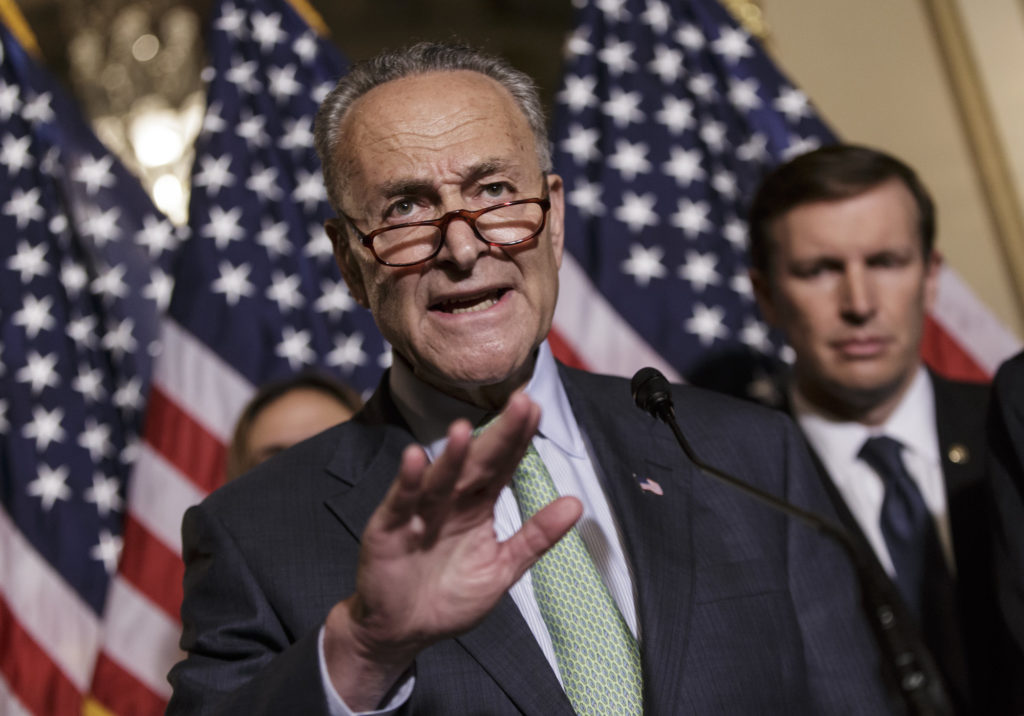
A divided Senate blocked rival election-year plans to curb guns on Monday, eight days after the horror of Orlando’s mass shooting intensified pressure on lawmakers to act but knotted them in gridlock anyway — even over restricting firearms for terrorists. In largely party-line votes, rejected were one proposal from each side to keep extremists from acquiring guns and another shoring up the government’s existing system of required background checks for many firearms purchases. With the chamber’s visitors’ galleries unusually crowded for a Monday evening — including people wearing orange T-shirts saying #ENOUGH gun violence — each measure fell short of the 60 votes needed to progress. Democrats called the GOP proposals unacceptably weak while Republicans said the Democratic plans were overly restrictive. The stalemate underscored the pressure on each party to give little ground on the emotional gun issue going into November’s presidential and congressional elections. It also highlighted the potency of the National Rifle Association, which urged its huge and fiercely loyal membership to lobby senators to oppose the Democratic bills. “Republicans say, ‘Hey look, we tried,’” said Senate Minority Leader Harry Reid, of Nevada. “And all the time, their cheerleaders, the bosses at the NRA, are cheering them.” Senate Majority Leader Mitch McConnell, R-Ky., said the Orlando shootings — in which the FBI says the American-born gunman swore allegiance to a leader of the Islamic State group — show the best way to prevent attacks by extremists is to defeat such groups overseas. “Look, no one wants terrorists to be able to buy guns or explosives,” McConnell said. He suggested that Democrats were using the day’s votes “as an opportunity to push a partisan agenda or craft the next 30-second campaign ad,” while Republicans wanted “real solutions.” That Monday’s four roll-call votes occurred at all was testament to the political currents buffeting lawmakers after gunman Omar Mateen‘s June 12 attack on a gay nightclub. The 49 victims who died made it the largest mass shooting in recent U.S. history, topping the string of such incidents that have punctuated recent years. The FBI said Mateen — a focus of two terror investigations that were dropped — described himself as an Islamic soldier in a 911 call during the shootings. That let gun control advocates add national security and the specter of terrorism to their arguments for firearms curbs, while relatives of victims of past mass shootings and others visiting lawmakers and watching the debate from the visitors’ galleries. GOP senators facing re-election this fall from swing states were under extraordinary pressure. One, Sen. Kelly Ayotte of New Hampshire, voted Monday for the Democratic measure to block gun sales to terrorists, a switch from when she joined most Republicans in killing a similar plan last December. She said that vote — plus her support for a rival GOP measure — would help move lawmakers toward approving a narrower bipartisan plan, like one being crafted by Sen. Susan Collins of Maine. Monday’s votes came after Sen. Chris Murphy, D-Conn., led a near 15-hour filibuster last week demanding a Senate response to the Orlando killings. Murphy entered the Senate shortly after the December 2012 massacre of 20 first-graders and six educators in Newtown, Connecticut, but that slaughter and others have failed to spur Congress to tighten gun curbs. The last were enacted in 2007, when the background check system was strengthened after that year’s mass shooting at Virginia Tech. With Mateen’s self-professed loyalty to extremist groups and his 10-month inclusion on a federal terrorism watch list, Sen. Dianne Feinstein, D-Calif., proposed letting the government block many gun sales to known or suspected terrorists. People buying firearms from federally licensed gun dealers can currently be denied for several reasons, chiefly for serious crimes or mental problems, but there is no specific prohibition for those on the terrorist watch list. That list currently contains around 1 million people — including fewer than 5,000 Americans or legal permanent residents, according to the latest government figures. No background checks are required for anyone buying guns privately online or at gun shows. The GOP response to Feinstein was an NRA-backed plan by Sen. John Cornyn, R-Texas. It would let the government deny a sale to a known or suspected terrorist — but only if prosecutors could convince a judge within three days that the would-be buyer was involved in terrorism. The Feinstein and Cornyn amendments would require notification of law enforcement officials if people, like Mateen, who’d been under a terrorism investigation within the past five years were seeking to buy firearms. Republicans said Feinstein’s proposal gave the government too much unfettered power to deny people’s constitutional right to own a gun. They also noted that the terrorist watch list has historically mistakenly included people. Democrats said the three-day window that Cornyn’s measure gave prosecutors to prove their case made his plan ineffective. The Senate rejected similar plans Feinstein and Cornyn proposed last December, a day after an attack in San Bernardino, California, killed 14 people. Murphy’s rejected proposal would widely expand the requirement for background checks, even to many private gun transactions, leaving few loopholes. Senate Judiciary Committee Chairman Charles Grassley of Iowa, defeated plan increased money for the background check system. Like Murphy’s measure, it prodded states to send more records to the FBI, which operates the background check system, of felons and others barred from buying guns. Grassley’s proposal also revamped language prohibiting some people with mental health issues from buying a gun. Democrats claimed that language would roll back current protections. Monday’s votes were 53-47 for Grassley’s plan, 44-56 for Murphy’s, 53-47 for Cornyn’s and 47-53 for Feinstein’s — all short of the 60 needed. Separately, Collins was laboring to fashion a bipartisan bill that would prevent people on the no-fly list — with just 81,000 names— from getting guns. There were no signs Monday that it was getting wide support or would receive a vote. Republished with permission of The Associated Press.
GOP-led Congress moves to block Barack Obama’s Clean Power Plan
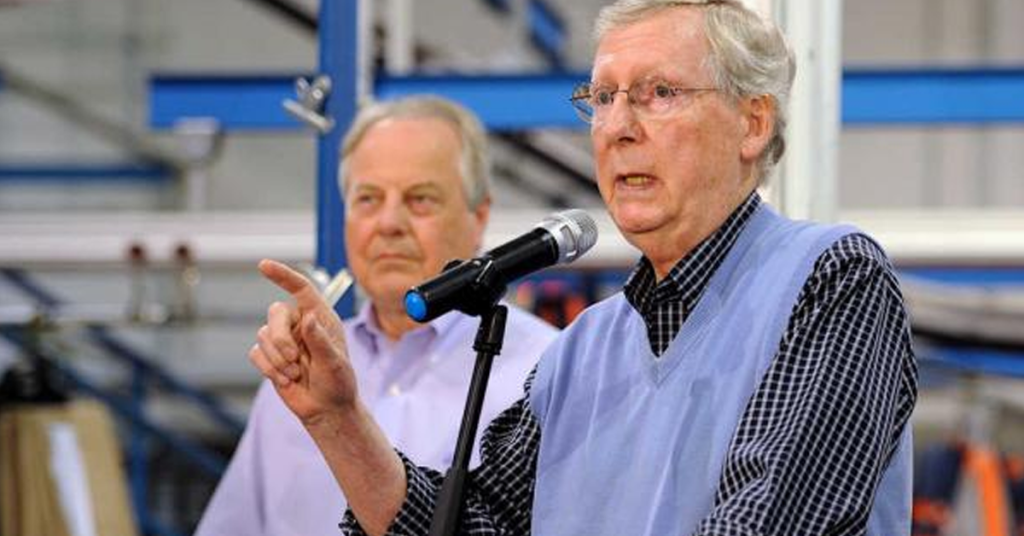
Congressional Republicans are moving to block President Barack Obama‘s plan to force steep cuts in greenhouse gas emissions from U.S. power plants. Senate Majority Leader Mitch McConnell and Rep. Ed Whitfield say they will file resolutions early this week opposing Obama’s plan to impose new regulations on new and existing coal-fired plants. The two Kentucky Republicans were expected to file the challenges filed under the little-used Congressional Review Act, which allows Congress to block executive actions with simply majority votes. The maneuver is subject to a presidential veto and has rarely been successful in overturning executive branch rules. Still, it allows opponents to set up votes calculated to embarrass the Obama administration ahead of international climate talks in Paris this fall. Republican senators are expected to tout the congressional challenge in a series of floor speeches starting Tuesday. One notable exception is New Hampshire Sen. Kelly Ayotte, who became the first GOP senator to support Obama’s sweeping regulation that mandates carbon emissions cuts from the nation’s power plants. Ayotte, who is locked in a difficult re-election fight, said Sunday that the Clean Power Plan would “address climate change through clean-energy solutions that will protect our environment.” New Hampshire is already well on its way to meet the plans’ goals, Ayotte said, adding that she would monitor the plan to ensure it does not have an adverse impact on state energy costs. McConnell said in a statement that the regulations being imposed under the Clean Power Plan “make it clearer than ever that the president and his administration have gone too far – and that Congress should act to stop this regulatory assault.” The administration’s “crusade for ideological purity” threatens the livelihoods of coal miners and their families in Kentucky and other states, McConnell said. “These are Kentuckians who just want to work, provide for their families and deliver the type of low-cost energy that attracts more jobs to Kentucky. And coal is what allows so many of them do all that,” he said. The congressional resolutions follow court challenges filed Friday by industry groups and states dependent on fossil fuels. The challenges from all but two of the 25 states were filed by Republicans. They deride the plan as an “unlawful power grab by Washington bureaucrats” that will kill coal mining jobs and drive up electricity costs. The Obama administration and environmental groups counter that the rules are needed to cut carbon emissions while curbing the worst impacts of climate change and sea-level rise. They also say the plan will spur new clean-energy jobs. The new rules require states to cut carbon emissions by 32 percent by 2030, based on emissions in 2005. Each state has a customized target and is responsible for drawing up an effective plan to meet its goal. The EPA says it has authority to enact the plan under the Clean Air Act. Republished with permission of The Associated Press.


